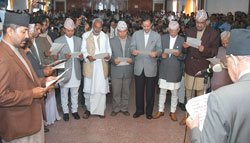|
|
The second Jana Andolan had two agendas: peace, and the establishment of democracy. It was understood that democracy would mean democratisation of the political parties too.
We've achieved democracy in broad terms since 24 April, 2006, but the political parties remain undemocratic. The People's Movement was successful last year because the political parties promised to mend their ways. They'd suffered during the royal regime and people believed them when they said they would be different from then on. But the promises have not been put into practice.
Nepal in 2006 was different from the country today. The Jana Andolan did result in some achievements, one of which is that regular Nepalis found a voice-for example, singer Rubin Gandharba is now more popular than the king. However the period of transition has just become longer and the political situation is still not stable. The law and order situation is getting worse, the supply situation is deteriorating, and there are many political uncertainties that need to be addressed urgently. We are on the right track towards democracy, the Maoists have given up arms, and the parties are thinking about long-term plans.
The reason for much of the uncertainty is that there is no democracy within the political parties. The parties have efficient youth leaders, but they have not been allowed to work. The Gyanendra in Naryanhiti may be weak, but the Gyanendras within the political parties are still very strong. The new order of things does not just mean new kings with old ideas, which is why there is an urgent need to end the nepotism inside the parties and make way for new leadership.
The people won last year, but they are already disappointed with the way things are going. The inconsistencies between the promises made and the reality today have given rise to hatred for the system. Who knows when it will erupt again? The political parties seem to have barely given a thought to the possibility that regressive forces could take advantage of this hatred. Democracy is becoming synonymous with instability, poverty, and insecurity. The peace process is not moving as quickly as people expected. No concrete plans have been made to ensure that the country's future is secure. All this will push the people to think the country is nothing without the king.
Do we need to be ruled by someone? Do the people of Nepal not understand anything about self-rule? Do we always need an master?
A year after the second People's Movement, the Nepali people are asking these burning questions. There is hope that all sectors will be democratised, but the leaders for such change have to be the political parties.



